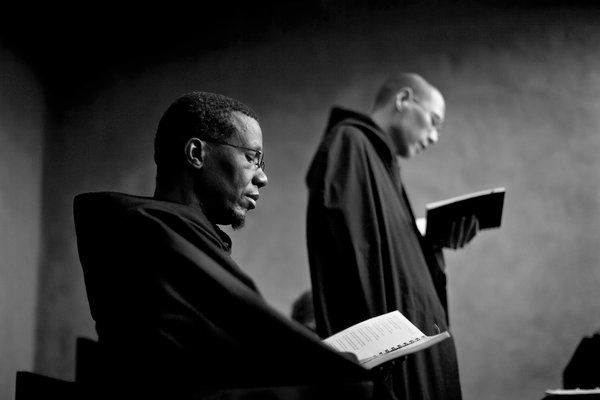By Fr. Paul Sheller, OSB, Vocation Director, Conception Abbey, The Catholic Gentleman
1. Cultivate Silence
St. Benedict wrote, “Speaking and teaching are the master’s task; the disciple is to be silent and listen” (RB 6:8). Silence is the environment that allows you to listen to God’s voice and the voices of those around you properly. Many people are uncomfortable with silence or they find it awkward, so they fill their days with needless noise and distractions. Turning off the music and radio, especially when you are in the car, moderating television or Internet use will challenge you to listen to the God who dwells within you and speaks in the depth of your heart. Additionally, being silent helps us to avoid the sins of gossip or detraction. St. Benedict echoed the wisdom found in the Book of Proverbs which says, “In a flood of words you will not avoid sin,” (RB 6:11). By avoiding unnecessary noise in your life, you learn to cultivate inner silence, which is the ideal setting for prayer.
2. Be Faithful to Daily Prayer
St. Benedict said, “Prayer should, therefore, be short and pure, unless perhaps it is prolonged under the inspiration of divine grace” (RB 20:4). This instruction is comforting for those who have a demanding workweek, hectic schedule, and are burdened with numerous responsibilities at home to the extent that they may not be able to dedicate large periods of time to prayer. Nevertheless, you should find time in the morning to praise God before your day begins, and pray in thanksgiving during the evening before going to bed. You can pray the Liturgy of the Hours to sanctify the day, specifically being faithful to Morning and Evening Prayer. Whatever your practice, you want to be concerned with developing a heartfelt attitude to God while you are praying, offering yourself and your loved ones into God’s care. Many opportunities will arise throughout the day to offer brief prayers of trust in God. The aim of monks (and all Christians) is to pray without ceasing, and you can do this by keeping the memory of God alive in your heart and mind at every moment.
3. Form Authentic Community
Monks support and encourage the brother encountering difficulties, and they celebrate with one another during joyful times. St. Benedict instructed, “No one is to pursue what he judges better for himself, but instead, what he judges better for someone else. To their fellow monks, they show the pure love of brothers” (RB 72:7-8). In a world of individualism, social media and superficial relationships, all people long for a deep sense of belonging and communion with one another. The spiritual life is always a journey that we undertake with others. You have to be willing to invest the time and energy to engage personally with other people and show interest in their lives, allowing your conversations to pass from surface level topics to the more meaningful areas of life. You may wish to gather with others who share your faith, values, and desire for God. Praying together, reading and discussing a spiritual book and Bible studies are all ways of coming together to grow in faith.
4. Make time for Lectio Divina
The ancient monastic practice of Lectio Divina or “sacred reading” emphasizes a slow, prayerful reading of Sacred Scripture that is intended to allow you to listen to the Word and seek peace in God’s presence. St. Benedict warned his monks, “Idleness is the enemy of the soul. Therefore, the brothers should have specified periods for manual labor as well as for prayerful reading” (RB 48:1). Reflection on the Word of God, if done intensely and prayerfully, has the power of calling you to a continual conversion of life. Familiarize yourself with the method and take between 15-30 minutes a day in a quiet environment to practice lectio divina with Scripture or prayerfully read from the writings of the saints or other great spiritual works. Spiritual reading nourishes your mind and soul and often provides those inspired words that you needed to hear. Encountering the Word of God each day in a prayerful manner draws us into deeper communion with the One who speaks the word to us.
5. Practice Humility
Numerous parts of the Rule of St. Benedict highlight the importance of humility, most notably in Chapter 7 where St. Benedict depicts humility as a ladder with twelve rungs which the monk is to ascend. The first step is that a monk keeps the “fear of God” always before his eyes (RB 7:10). When you fear God or are in “awe” of God, you maintain a right relationship, realizing that you are a creature and not God. Humility is a virtue that needs to be developed, and it entails being down to earth, honest, and truthful, both in prayer, at work, and in everyday matters. St. Benedict wrote, “Place your hope in God alone. If you notice something good in yourself, give credit to God, not to yourself, but be certain that the evil you commit is always your own and yours to acknowledge” (RB 4:41-43). Being a humble person means being grateful for the blessings and opportunities that God gives you and recognizing that your gifts and talents have God as their source. Allow daily struggles, and even falling into sin, to be an invitation to humility, where you admit without hesitation that you must depend entirely on God’s grace, and not on your strength.







